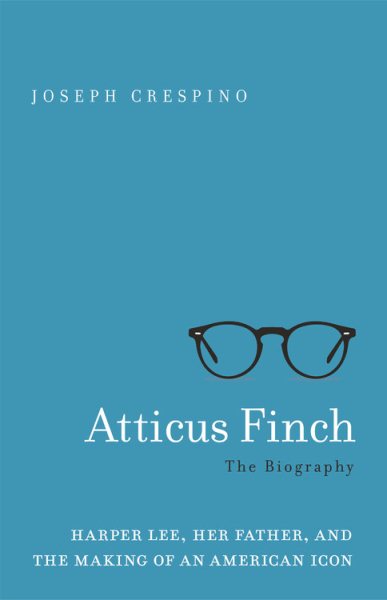Interview by Jana Hoops. Special to the Clarion-Ledger Sunday print edition (May 27)
A native of Macon, political historian Joseph Crespino has enjoyed a successful career as a writer whose books help to explain and interpret some of the most pivotal times and people of the American South, especially within the context of politics.
 His most recent work, Atticus Finch, the Biography: Harper Lee, Her Father, and the Making of an American Icon, gives a thought-provoking case for the mostly understood assumption that the character of Atticus Finch in Harper Lee’s To Kill a Mockingbird and Go Set a Watchman is, indeed, her father, A.C. Lee.
His most recent work, Atticus Finch, the Biography: Harper Lee, Her Father, and the Making of an American Icon, gives a thought-provoking case for the mostly understood assumption that the character of Atticus Finch in Harper Lee’s To Kill a Mockingbird and Go Set a Watchman is, indeed, her father, A.C. Lee.
Crespino ties up the details most readers have only speculated on about the Finch-Lee comparisons, and examines the truths about the real man, A.C.
A professor of history at Emory University in Atlanta, Crespino went on to earn a master’s degree from the University of Mississippi and a doctorate from Stanford University.
His other books include the political biography Strom Thurmond’s America and In Search of Another Country: Mississippi and the Conservative Counterrevoultion, which earned the nonfiction prize given by the Mississippi Institute of Arts and Letters, among other awards.
He talks about his Mississippi heritage.

Joe Crespino
“I’m from Noxubee County, where my mother’s side of the family has lived since the 1830s. My dad was from the Delta–he grew up in Benoit–and my parents met at Ole Miss, where my dad played on some of the best of Johnny Vaught’s legendary teams before going on to play in the NFL for eight seasons. My parents moved to Macon after my dad retired, and that’s where I was born and grew up.
“After graduating from college, I taught at Gentry High School in Indianola for two years as part of the Mississippi Teacher Corps and earned my master’s degree in secondary school education as part of that program. My wife, Caroline Herring Crespino, is from Canton.
Describe the character Atticus Finch in your own words.
Atticus Finch is a fictional character that should be understood in the full context of Harper Lee’s creative efforts–not merely as the upright, civic-minded figure who vigorously defends a wrongly accused black man in the 1930s, but also as a character in the 1950s South who is embittered over the changes being demanded by the modern civil rights movement. Exclusive sources that I gained access to in writing this book make clear that Harper Lee always imagined these two seemingly contradictory figures as different aspects of the same character, seen at different times, and through different lenses.
Summarize the real A.C. Lee for us, based only on his writing and actions.
Like Atticus Finch, A.C. Lee was a lawyer and state legislator from a small town in south Alabama. Unlike Atticus, A.C. was also the co-owner and editor of a small-town newspaper, the Monroe Journal, for nearly 18 years. I’ve read every one of the editorials he wrote over those years, and, through them, I’ve reconstructed A.C. Lee’s political worldview. Clearly, he was the inspiration both for the idealistic figure in To Kill a Mockingbird as well as the reactionary figure in Go Set a Watchman.
In your opinion, was A.C. Lee typical of the “educated” white Southern Christians of the time, torn between doing what he knows is right and trying to survive in a racist society?
Well, first off, A.C. Lee wasn’t well-educated, at least not in terms of formal schooling. He was born in 1880, and the highest grade he ever completed was eighth grade, although he was Lincoln-esque in his habits of reading and self-education.
Second, the typical white Southern Christian of the time was not “torn” in the way you describe–and neither was A.C. Lee–so, in that sense, he was typical. Lee had no trouble surviving in the racist society because he was white. I found no evidence that he had any doubts about the rightness of his racist, paternalistic view of blacks. That’s not to say that Lee wasn’t a moral person in many respects, but it’s wrong to assume that white Southern Christians of an earlier era had some moral sensibility in regard to race that they couldn’t act on without threatening their standing in society. It makes it sound like they were among the victims of the Jim Crow South, when, in fact, they were the chief defenders of it. One way A.C. Lee wasn’t typical was as a Christian. He was much more devout and sincere than any of the typical Christians I know, and count me among those typical Christians. He was a pillar of the Methodist Church in Monroeville. But, as was the case with all but a tiny minority of white Christians of his era, his religious faith was in no way in tension with his racial views. One of the most poignant stories in the book is how in the early 1950s, as chairman of the pastoral relations committee of the Monroeville Methodist Church, Lee engineered the ouster of a young minister, Ray Whatley, who spoke too frankly about racial issues. Whatley was reassigned to a pulpit in Montgomery, right before the black community there started a boycott to protest segregation on city buses. Whatley volunteered to serve as president of the local Council on Human Relations. His vice-president was a young black minister new to town himself whose name was Martin Luther King Jr.
Harper’s two books, Mockingbird and Watchman, seem to show two different sides of Atticus Finch. Was this only her attempt to show two different sides of the South at that time?
I don’t think that she was explicitly trying to show two different sides of the South, so much as she was struggling to try to reconcile them in her own mind. It seems to me that if she had really wanted to show that other side of Atticus, then she would have come back to Go Set a Watchman and tried to make that novel work in a more successful way. Why she never did that in the 1960s, or 70s, or 80s after the incredible success of Mockingbird, and when so much political and racial struggle was still taking place, is a fascinating question. I offer some thoughts in the epilogue of the book as to why that might have been.
In a 1964 radio interview, Harper Lee discusses why she thinks the South has produced so many great writers: Western European heritage, agrarian society, etc. Do you see any correlation between this and the racism that she writes about?
Yes. In Go Set a Watchman, the character of Uncle Jack expresses lots of hoary ideas about the ethnic homogeneity of the white South as key to its distinctiveness. There’s no reason to think that Harper Lee’s views on the subject were the same as Uncle Jack’s, but clearly, she knew all those old arguments, and I suspect that, like Jean Louise in Watchman, she was trying to figure out whether there was anything to them, or whether it was all just a bunch of bunk.
It has been reported that Mockingbird is a “highly revised version”of Watchman. What is your opinion?
It’s incorrect. Documents from the files of Lee’s publisher, HarperCollins, make this clear. Harper finished a draft of Go Set a Watchman and her agent shopped it around to various New York publishers. White he did that, she started writing a new novel that used the same characters, but moved the drama back some 20 years in time to the 1930s. She and her agent discussed how she could write a bridge that could connect these separate pieces, a reference that Lee’s representatives have taken to suggest that she has plans at one point for a trilogy.
The documentary record is quite murky on that point, but what is clear is that she always imagined Watchman and Mockingbird as distinct novels that connected as part of a larger narrative arc in the lives of these characters.
What drew your special interest in Harper Lee, Mockingbird, and Atticus Finch?
Many different things. One is that I grew up in a small Southern town like the one that Harper Lee was from. Another is that for a significant part of my life, I wanted to be Atticus Finch; a lot of earnest, well-intentioned white boys like myself, who were also naïve and misguided, have chased that ghost for many decades now.
But in the last year or two, I came back to Harper Lee’s fiction because I think it has resonance for our own political moment. Harper Lee wrote her two books in the late 1950s South, at a time when right-wing, demagogic politicians–many of whom were nobodies, or political jokes in Southern politics only a few years earlier–won tremendous political power by appealing to the most base instincts of voters. I think her struggles in writing the character of Atticus Finch were part of her struggle to make sense of her father’s own conservative political heritage at a time when the conservatives had been overrun by right-wing reactionaries. Why didn’t folks like her father stand up for their principles when it really mattered?
Are you now working on a new book or other writing project?
I have at leas two other books in mind at this point. One is a history of Atlanta during the five or six years after Martin Luther King Jr. Moved back to his hometown from Montgomery. I imagine it as a book about prophets, and hometowns and unwelcomeness.
I also want to write a history of racial violence in Noxubee County, my home county.
Joe Crespino will be at Lemuria on Wednesday, June 6, at 5:00 p.m. to sign and read from Atticus Finch: The Biography.


Comments are closed.